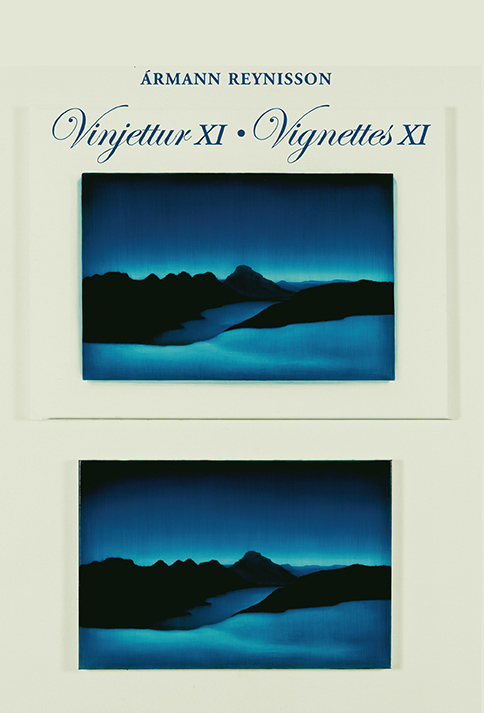Vignettes X
Vignettes X contains twenty four stories about Iceland’s new age Vikings, their unbridled greed, the collapse of the banks, the recession, and the consequences of a man-made catastrophe on both individuals and the Icelandic nation. There are also ten tales relating directly to the author’s family in the years 1850–2000 that tell of their daily lives and struggles. These are people who worked hard work to survive and who laid the basis for national independence and prosperity with a belief in their country as their guiding light. The remaining nine vignettes are varied in their content. Ármann Reynisson’s vignettes employ an innovatory form and have won a reputation for themselves both in Iceland and abroad. Brief but pithy, always contained within the space of a page, they open a vista into a larger world. They make excellent reading material either for contemplation or can read out loud, depending on the occasion in hand.
Chapters
The couple at Ytri-Brekkur
The rich and vast farmland of Ytri Brekku is located in Þistilfjörður, just south of Þórshöfn, in the county of Þingeyarsýsla. On the north side of the land the majestic Fossá River plunges over the sheer cliff of the Brekkna Mountain. In the last decade of the nineteenth century, Sigríður Davíðsdóttir (1852 -1921) from the Mývatns and Bárðadal area and Vilhjálmur Guðmundsson (1854 -1912) from Skálum in Langanes, buy some land, raise a sturdy timber house and start what becomes an outstanding farm. The farmer’s parents and siblings emigrate to North America in order to escape the harsh conditions. His sweetheart stands in the path of his shapely steed and calls out: ‘What a shame that such a dashing man should abandon his native country.
The household at Syðri-Lón
In the first decade of the twentieth century self-sufficient farming and bartering are still held in high esteem. Those who receive an income or perks for serving in positions of responsibility are able to allow themselves much needed tools and some luxury items. Each home has its own traditions built upon national customs and lives in accordance with its circumstances. The horse is still man’s most important servant. There are few roads, no electricity and no telephones in most regions for some decades. Most things are still done by hand and workhorse. The houses are lit by oil lamps or candles and are heated with coal, oil or driftwood.
Greedification
At the very onset of the new century a group of young ambitious entrepreneurs arrive on the scene and make their presence know. Most of them have never experienced hardship and have little understanding of how ordinary people live. They introduce a new age where money and materialism are worshipped as never before. The lives of these new apostles seem like one big business model.
The golden calf
The Old Testament tells us of the moment when Moses led the Israelites out of slavery in Egypt, many thousand years ago. Once most of the adversity has been overcome the people sacrifice a golden calf and celebrate with frenzied dancing around its body. In the meantime their leader is far away speaking with his maker and receiving the Ten Commandments. Moses returns and flies into a fury over the crime committed against the Almighty. He throws the tables of stone to the ground at the base of the mountain and they shatter. He then melts the golden calf and grinds it to powder.
Collapse
The autumn is approaching after what has been a unique summer season. The weather has been favourable to the local farmers. The nation’s politicians dash to foreign destinations in their luxuriously appointed private jets. After all, the leaders of the nation must keep up with the lifestyle of the new age Vikings. They make a bid for a seat in the UN Security Council, to help secure world peace, but pay little attention to the mounting problems awaiting them at home. At about the same time as the autumn low pressure fronts arrive, each producing its share of rain, the authorities begin to realise that there is a different kind of storm approaching, one over which they will have no control. As the first day of winter draws near, three of the nations main banks collapse, one after the other, and are overtaken by the state after six glorious years of privatisation.
The boys at the bank
New times call for new men. This is definitely the case when the nation’s banks are handed over to a specially selected group of young bucks. These are with their hair slicked back, of medium height, who wear dark suits with a double lining and gold cufflinks. They seem to sprout up from the earth at the ready to take on the international banking world, despite there being no real banking tradition in their homeland. They demand that foreign currency be taken up instead of the ISK and that English replace the native tongue.
New Age Vikings
The onset of the new century brings with it a group of young men, thrust into the limelight and eager to conquer the world in a second. These are bright boys from the bank who bring fresh knowledge from celebrated international business schools. They bring new ideas and endeavours with them to a country that has no experience in such matters, but embraces them nonetheless. Incidentally the banks become privatised during this period and are handed over to the dreamers.
The Oil barons
All oil deposits found around the world are usually under the control of a league of oil barons. Some of them enjoy all their profit themselves, whereas others choose to share with their fellow countrymen. This is also the situation in a country that relies upon the import of this black gold, where those that import it, control it. Three corporations monopolise the market, keeping prices up and dividing the profit between them.
The race for energy supplies
For decades the capital has concentrated its efforts on building an efficient power company that can provide its inhabitants with fairly priced power. The company sees to the distribution of electricity, geothermal energy for heating purposes and the blue water of the earth renowned for its purity. It has become a headquarters of invaluable technology that other countries can only strive for. The main offices are housed in a castle-like building that towers over the city and reminds us of the might of the company.
The happening
A ‘happening’ is a relatively new art form in comparison with many other age old artistic traditions. The art only exists as long as the artist’s performance and can deeply affect the audience. It is as if many art forms have been put together to produce a whole. They are often provocative and comment on current political or public issues and can elicit all manner of reaction from the audience. It takes a while for art lovers and the general public to appreciate this new art form and to comprehend the relevance of the ‘happening’ in modern society.
Everyday heroes
A whole nation of sleeping beauties wakes up to the jolt of a financial meltdown. When the fraudsters’ web of deceit is finally revealed most of them realise that a complete abandonment of reality has undermined the stable financial status of the state. They have fooled the government easily with their words of flattery and they are now like putty in their hands.“
The Protest
On the surface the administration seems faultless but in fact the rotting process began decades ago. The players simply tilt it in another direction so that they can don’t have take a good look at themselves or breathe in the dreadful smell of the rot. After the state has concluded its superb management of privatisation initiatives, it is given complete freedom to do as it pleases and without any apparent preparation. The newfound business freedom rapidly gains control of the authorities. When everything finally crumbles the curtain is drawn back and the whole nation witnesses the disgrace in its naked state.
Collapse
The autumn is approaching after what has been a unique summer season. The weather has been favourable to the local farmers. The nation’s politicians dash to foreign destinations in their luxuriously appointed private jets. After all, the leaders of the nation must keep up with the lifestyle of the new age Vikings. They make a bid for a seat in the UN Security Council, to help secure world peace, but pay little attention to the mounting problems awaiting them at home. At about the same time as the autumn low pressure fronts arrive, each producing its share of rain, the authorities begin to realise that there is a different kind of storm approaching, one over which they will have no control. As the first day of winter draws near, three of the nations main banks collapse, one after the other, and are overtaken by the state after six glorious years of privatisation.
Powerless at the power house
After many of the power companies have been merged it only seems fitting that an appropriate power castle be built. The castle stands on top of a hill, dominating the landscape and enjoys a magnificent view in all directions. The building draws the attention of everyone with all its splendour. Just outside the main entrance there is a waterfall and a pond that keeps out any unwelcome guests. Inside there are high ceilings, endless space and the building feels rather cold when the sun does not shine. Three enormous windows allow the light in. Large works of art both inside and outside give a certain style to the environment. The building has famously provided the setting for confrontational meetings and power struggles over this organisation that still belongs to the public. The new age Vikings of privatisation want to swallow the natural resources of the nation for a pittance. They have attempted to do this with everything else in the public sector but are not successful this time. Gallery 100 can be found within the building where ambitious art exhibitions are held and nothing is spared when it comes to grand openings.



